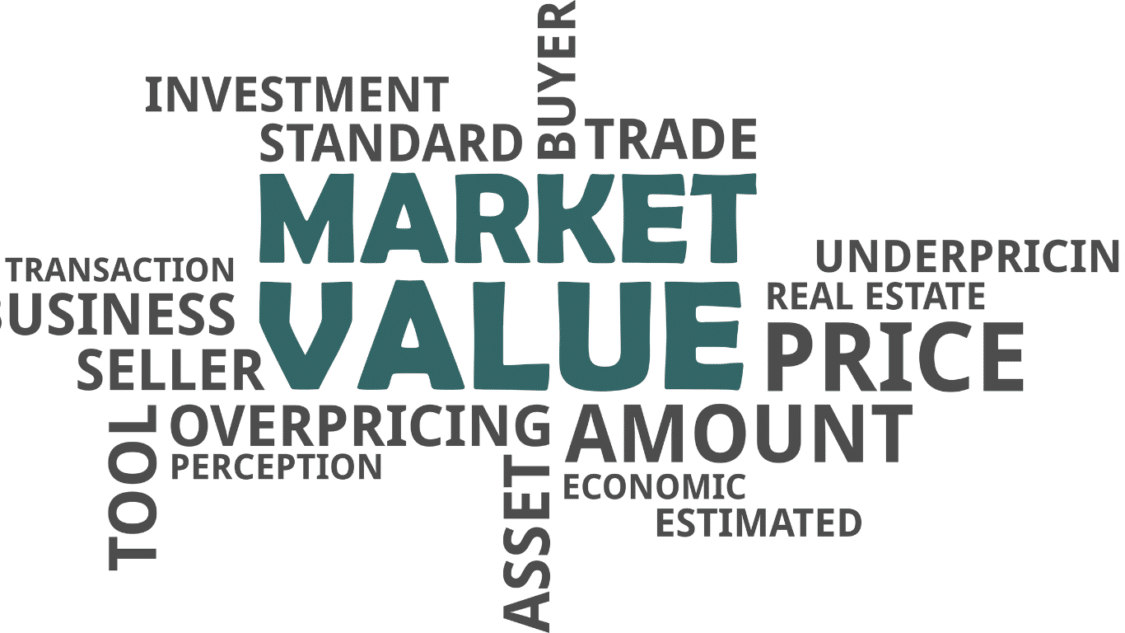Market value vs. market cap is paramount in economics, accounting, trading, and investing. The two terms are similar in that they assess the value and worth of the company. Besides market value and cap, there are other ways to determine a company’s size and value. These two, although, happen to be misleading terms to some. Let’s discuss the difference between the two terms and what information they provide regarding the company’s value.
Market Value vs. Market Cap Step by Step:
Market Capitalization

This is a measure based on the stock price. To calculate a company’s cap, you have to multiply the total number of shares by the going price of one share. Let’s use an example to make it more straightforward. Say a company has 50 million shares with a stock price of $100. The capitalization would be $5 billion. It usually determines the company’s value when contemplating future trading opportunities. However, in many cases, stock values are very subjective. A stock’s price does not rise according to a mathematical formula. Different pricing factors are weighted in different ways. Thus, even capitalisation is a somewhat subjective measure of value.
Market Value

As we explained above, capitalisation refers to the value or worth of a company; therefore, value of the market is the more complex version. It is defined by the valuations or multiples given to organizations by investors, such as price-to-sales and price-to-earnings. In addition to shareholder equity, these metrics consider outstanding bonds, long-term growth potential, company debt, taxes, and interest payments. The larger the value of a company, the higher the value. It depends on various other factors, such as the profitability of the company, its debt load, and the market environment.
The Difference between Market cap and value
Now that we have clearly defined the value vs. cap, let’s examine their differences. They are sometimes used interchangeably, referring to cap as value. However, they are referring to a particular form of value. Market capitalization is roughly the same as equity value.

While the terms are both corporate asset measurements, they use different methods to get the result:
Market capitalisation does not measure the company’s value because a thorough analysis of the company’s fundamentals is crucial for that. It is a fundamental evaluation of the value of a company. Moreover, although a company’s cap measures the cost of purchasing all of its shares, it does not reflect the cost of acquiring them. It is important to note that a company’s capitalization is a single measure of its worth. In contrast, the value considers numerous factors to give a broader perspective on the company’s financial status.
What is the market value of a company?
It is the total value of its outstanding shares of stock, often known as market capitalization market cap. It can be determined by dividing the current market price per share by the total number of shares outstanding. The value of a corporation indicates its perceived worth by investors in public marketplaces. It represents market participants’ evaluation of the company’s potential for development, profitability, and total worth. Companies with greater capitalizations are often considered more significant and more prominent in the market.
It’s necessary to remember that value can change due to variables such as investor attitude, economic conditions, industry trends, and company-specific news. The value of a market should not be mistaken for a company’s intrinsic worth, determined by its financial performance, assets, and prospects.
What is the market cap of a company?
A company’s market capitalisation is a measure of a company’s total value. It indicates the full value of a company’s outstanding stock shares. The market capitalisation is calculated by multiplying the current share price by the overall amount of outstanding shares.
What is market cap? A company’s market capitalisation implies its size and value. It often divides companies into large, mid, and small-cap categories. These classifications assist investors in assessing various industries’ risk and growth potential. Several factors impact market capitalisation, including stock price, number of shares outstanding, and investor mood. It is subject to change due to market fluctuations, corporate performance, industry trends, and other market variables.
Does higher market cap mean higher value?
No, a higher cap does not necessarily indicate a higher value. It is calculated by multiplying the current value by the number of outstanding shares. A company’s capitalisation is determined by multiplying its share price to the sum of outstanding shares.
It shows a company’s overall market worth as evaluated by investors. While this is an essential indicator for assessing a company’s size and relative importance, it does not immediately reflect its intrinsic value or financial performance. Several elements determine a company’s worth, including revenue, profitability, assets, liabilities, growth potential, and market dynamics.
Other fundamental metrics, such as earnings, cash flow, and valuation ratios, are key to determining a company’s net worth. In addition, market sentiment, investor perception, and industry trends can also affect stock prices and capitalisation, leading to a collision in a company’s perceived and actual value.
Is a higher value better?
The importance of a higher value is subjective and depends on the investor’s point of view. While it can signal positive elements such as investor confidence and growth potential, additional fundamental indicators and industry benchmarks must be considered for a complete review. Evaluating a company’s value and other relevant aspects is vital to make informed investment decisions.
Market cap vs Market share
While the cap of a company represents the total value of a company in the stock market, market share is the percentage of a specific market in terms of sales or revenue that a company controls. It represents the company’s market presence and competitiveness compared to its competitors.
How to calculate market capitalization?
The formula for calculating capitalisation is:
Market Cap equals the Stock Price x Number of Outstanding Shares
How to calculate market value?
The formula for calculating value is:
Market Value equals Stock Price x Number of Outstanding Shares
Market cap and Net Worth
A company’s market cap vs net worth are two important financial metrics used to evaluate the value and financial standing of companies and individuals. Net worth is a more comprehensive measure of wealth considering the difference between total assets and liabilities. It provides a complete picture of a person’s or company’s financial health. While capitalization only applies to publicly traded corporations, net worth applies to individuals and businesses. Understanding the distinctions between market capitalization and net worth aids in evaluating investment opportunities and overall financial well-being.
What factors can influence a company’s market cap and value changes?
Various factors influence changes in a company’s capitalisation and market value. The company’s financial success, particularly its earnings, is essential. Strong profit growth can promote investor confidence and increase capitalization and the value of the market, but lowered earnings might lead to a decrease. Market mood and investor perception also impact a company’s value, as overall market conditions and economic trends.
Furthermore, company-specific events such as management changes, product launches, and regulatory developments can impact market cap. Volatility can also be caused by external variables such as interest rates, geopolitical events, and macroeconomic situations. Understanding that capitalization and value are dynamic, reflecting various elements and the market’s ever-changing character, is critical.
How does the capitalisation affect a company’s position in the stock market?
Capitalisation significantly impacts a company’s spot in the stock market. A larger cap often signifies a larger, more established company, increasing investor interest and trust. It often attracts more institutional investors, increasing liquidity and trading volume for their shares.
Higher market capitalizations may also make it easier for businesses to raise financing via debt or stock issues. Furthermore, companies with greater market capitalizations usually attract more attention from analysts, media, and investors, influencing stock performance.
Closing Thoughts
Finally, value and capitalisation are two essential indicators in determining a company’s worth in the financial markets. The value is the price of a single share of a company’s stock multiplied by the number of outstanding shares. It shows the overall value allocated to the firm by investors at a certain point in time. On the other hand, capitalisation represents a company’s total value and is calculated by multiplying the stock price by the number of outstanding shares.
A company’s value and capitalisation are essential in determining a company’s size and relative worth in the market. However, the value can fluctuate due to supply and demand dynamics, whereas market capitalisation gives a more stable estimate of a company’s size. Investors use these measures to evaluate a company’s performance, value, and market position. Investors can make better-informed investing selections if they understand the differences between the value and capitalisation of the market.
For more news updates, visit our homepage now and see our latest news article. Want to learn more about trading? Visit our education page now and learn for FREE!




